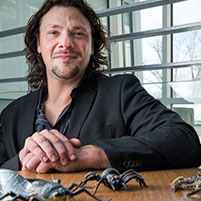Nature + Nurture
By Shilo Rea
 If you see a snake or spider, chances are it will scare you. Is your fear inherent or learned?
If you see a snake or spider, chances are it will scare you. Is your fear inherent or learned?
David Rakison believes it is both and that nature and nurture work together to help you develop fear for potentially threatening recurrent evolutionary threats. Rakison, associate professor of psychology, studies how infants learn about the world around them.
“Understanding how knowledge emerges and the mechanisms involved provides us with insight into the structure and function of the mind,” he said.
Rakison found that 5-month-old babies prefer to look at prototypical schematic images of snakes and spiders - rather than scrambled version of those things - but did not do so for rats or sharks.
“It reflects infants’ evolved mechanism to detect threats that were consistent throughout evolution,” Rakison explained. “Snakes and spiders are, and always have been, a potentially immediate lethal threat to infants, while the threat of rats is less direct. And, throughout evolution, humans spent little time in the ocean.”
His work has also shown that 11-month-old girls – but not boys – quickly learn to associate pictures of snakes and spiders with fearful faces. He believes this is because, throughout our evolutionary history, selective advantages arose for women who were more sensitive to potential danger and from men who were fearful.
On the other side, Rakison is currently using a National Science Foundation grant to research if and when babies can do deductive-like reasoning. He is finding that infants do not need to be shown information at the same time to understand that two things belong together – that is, they can remember things they have seen previous and come to associate them.
“It has always been assumed that infants can only learn associations that they experience directly,” he said. “However, my current research suggests that infants are clever enough to combine current and past experiences as they learn about the world.”
Rakison believes that getting to the heart of how nature and nurture affect learning is crucial for understanding both typical development, and for the early identification of atypical development.